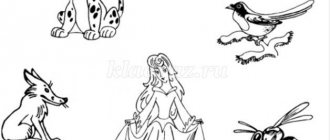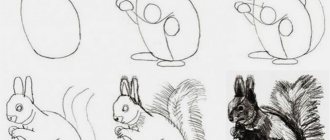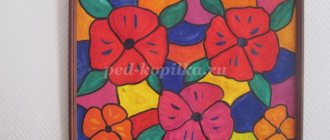Lesson summary, reflecting the specifics of work on the program for the formation of prepositional case forms.
The author presents a summary of the lesson, reflecting the specifics of the work on the program for the formation of prepositional-case constructions. This lesson illustrates the process of formation of integrative qualities of a preschooler according to FGT, in particular communicative ones - consolidation of prepositions with spatial meaning in auditory-speech and visual memory, development of inflection and word formation skills, coherent speech.
Topic: "Vegetables"
Target:
Strengthen the ability to use nouns in the prepositional case with the prepositions “in” and “on”
Tasks:
Communication development
- Differentiate the use of the prepositions “in” and “on”.
- Practically master the simplest methods of word formation by adding diminutive suffixes to nouns.
- Strengthen the ability to use verbs of the 1st person, present tense, indicative mood, singular.
- Development of the ability to compose a descriptive story using supporting diagrams.
Intellectual development
- Differentiate between vegetables that grow in the ground and vegetables that grow on the ground
- Teaching how to use the names of vegetables in active speech
- Develop sensory standards by relating vegetables to color and shape
- Develop voluntary attention and memory
Social and personal development
- Development of independence, discipline, accuracy
- Develop the ability to critically evaluate your own activities and the activities of others
- Develop the ability to work according to verbal instructions
Physical development
- Develop fine motor skills of fingers
- Develop spatial perception
Summary of a speech therapy lesson for children with special needs in the preparatory group. Vegetables
Summary of a speech therapy lesson for children with level 3 OHP in a pre-school group.
"Vegetables. We are harvesting." Author: Ryabina S. A., speech therapist MBOUNSHDS No. 48, city.
Noginsk. I offer a summary of a speech therapy lesson for children with OHP level 3 speech underdevelopment for children 6-7 years old.
This material will be useful to speech therapists working in correctional kindergartens and speech therapists working at speech centers. The abstract is aimed at forming and clarifying the vocabulary on this topic, the formation of lexical and grammatical structures. Objectives: 1. To consolidate ideas about vegetables; 2. Formation of word formation skills; 3. Correct and develop coherent oral speech; 4. Replenish passive and active vocabulary; 5. Give students an idea of where vegetables grow and how they are harvested. Equipment: Vegetables (pictures, dummies, natural, cut-out pictures, templates, stencils).
Lesson progress
1. Organizing the beginning of the lesson Checking readiness for the lesson, reporting the topic. 2. Updating and testing students’ knowledge on the topic “Vegetables”. Each child has a picture of a vegetable. Children name their vegetable and sit down. 3. Studying new material. Work on speech material. The speech therapist demonstrates vegetables, tells them what they are called, where they grow and how they are prepared. Students are involved in the conversation. On a magnetic board there are images of beds, pictures of vegetables. We plant vegetables in the beds. Children come to the board one by one, name the vegetable, and plant it in the garden. Further, the speech therapist emphasizes that each vegetable is harvested differently. Carrots, radishes, turnips, beets are pulled out. Cucumber, tomato, peas are removed, Potatoes are dug up. Cabbage, pumpkin, zucchini are cut off. The speech therapist asks questions to help you understand the material. Physical exercise One, two, three, four (marching), Children learned vegetables. Onions, radishes, zucchini, (they jump up, clapping their hands) Horseradish, carrots, garlic. 4. Consolidation of the studied material • Drawing up proposals. Demonstration of dummies, pictures or natural vegetables. The tomato is round, and the carrot... The radish is small, and the radish... The cucumber is oval, and the pumpkin... The zucchini is large, and the potatoes... The onion is bitter, and the peas... The cucumber is green, and the beets... Carrots grow in the ground, and the tomato... • “Call it affectionately” Education noun with diminutive suffixes. Cucumber - cucumber, Tomato - ... Peas - ... Pepper - ... Turnip - ... • “What will we cook?” Let’s make potato soup from potatoes, Make tomato soup from tomatoes, Onion soup from onions, Pumpkin soup from pumpkin. A conversation about what can be prepared from vegetables, what vegetables will become if they are frozen, pickled, boiled, stewed, fried, canned. • Development of fine motor skills. Outlining vegetables according to a stencil, template, modeling from plasticine, painting, shading. • Development of coherent oral speech skills. The story “Basket of Vegetables.” The speech therapist reads the story, and as the children read, they go to the board and insert the desired vegetable into the slot in the basket. Repeat each sentence, breaking it into two logical parts. Zina collected the harvest and put it in a basket. Here is a red tomato, a wonderful vegetable. Here is an oval cucumber, a great green one. Here is a beautiful carrot, a long braid. Here are delicious potatoes for soup and okroshka. • Psycho-speech gymnastics “Hide the syllables in your palms.” Children clap off the syllable structures of words: po-mi-dor, o-gu-rets, peas... • Compiling vegetables from cut-out pictures. Collect a vegetable, name it, come up with a descriptive story about it. • Making riddles about vegetables. • Summing up, answering the speech therapist’s questions (what topic was studied, name the vegetables, where and how they grow, what can be prepared from them, what are the benefits of vegetables).
We recommend watching:
Summary of educational activities in the preparatory speech therapy group. Summary of the frontal lesson in the preparatory group. Sound and letter AND GCD for teaching literacy to children in the preparatory school group “Sounds [B], [B]. Letter B" Summary of a speech therapy lesson on teaching literacy for children in the preparatory group
Similar articles:
Lesson summary on the topic “Musical Instruments” in the preparatory group
Summary of a lesson on speech development on the topic “Pushkin's Tales” in the preparatory group
Speech therapy work with older children with special needs. Summary of speech therapy lesson “Vegetables”
Nomination: notes on speech therapy sessions with children 4-5 years old. Summary of subgroup speech therapy classes on the formation of lexical and grammatical categories and the development of coherent speech in the senior group for children with ODD.
Theme "Vegetables". Goals:
- Expand and activate vocabulary on the topic.
- Learn to form plural number from nouns.
- To form educational skills. p, units including nouns.
- Work on the category of nouns with diminutive and affectionate suffixes.
- To develop children's attention, visual memory, and tactile sensation.
Equipment: natural vegetables, Mole and Mouse toy, “Bunny Garden” game, magic bag with vegetables.
Progress: Organizational moment Some kind of animal came to visit us. Here is a riddle about him: He made a hole, dug out a crust, the Sun is shining, but he doesn’t know. The cunning one is tearing up the garden with his nose... (mole). New message. — Mole, a gardener, came to visit us. Why is he called that? All summer the Mole worked in his garden and harvested a large harvest of vegetables. The mole lives in the ground, he is blind and knows vegetables only by taste. Let's help Mole, tell him what the vegetables are called. (the teacher lays out the vegetables and shows them, the children repeat).
Also an interesting speech therapy lesson: Summary of a speech therapy lesson with children 4-5 years old in kindergarten.
Game "One - Many". - Do you think the Mole grew one cucumber, or many? I will name one vegetable, and you will name many. — One cucumber, but when we have too many, how do we say? - Cucumbers. Tomato - tomatoes, zucchini - zucchini, onion - onions, carrot - carrots, turnip - turnips, pumpkin - pumpkins, beets - beets, bed - beds, bush - bushes, heads of cabbage - heads of cabbage, vegetable garden - vegetable gardens.
The game “what is gone”. -The mole worked all summer, and the mouse was idle. One day the Mole went to bed, and the mouse decided to steal his vegetables. (there are 4 vegetables on the table, the teacher removes one vegetable, and the children must answer which vegetable is missing).
Development of fine motor skills. There are a lot of beds in the garden: (clench and unclench your fists). Here are turnips, and lettuce, here are beets, and peas, (bend your fingers one at a time). Are potatoes bad? Our green garden. (alternately strikes with palms and fists). It will feed us for a whole year!
Game "Big - small". -The Mole woke up, saw the thief Mouse, but did not scold her. He shared the harvest with her. The mole said: “I’m big, and I’ll keep the big vegetables for myself, and you’re little, I’ll give you the small vegetables.” - a big cucumber, and a small one...? -cucumber. Tomato - tomato, cabbage - cabbage, pumpkin - pumpkin, beet - beetroot, potato - potato, carrot - carrot, pea - pea, onion - onion, bed - bed, bush - bush, head of cabbage, turnip - turnip.
Speech therapy work with older children with special needs. Summary of speech therapy lesson “Vegetables”.
Game "Zaikin's garden". (on the board there is a poster “Zaykin’s vegetable garden”). — The bunny grew a crop of vegetables in the garden and put them in two bags. - Name the vegetables in the first bag. - name the vegetables in the second bag. — Which bag has more vegetables? - What's not in the first bag? - What's not in the second bag?
7. Game “Wonderful bag”. - Mole watched as Bunny carefully laid out all the vegetables and decided to do the same. But he only had one bag and all the vegetables were mixed up. Let's help Mole find the same vegetables. The teacher has a bag of fresh vegetables. Vegetables are poured onto the table, the children call them. Then the vegetables are poured back into the bag. Children take turns taking out one vegetable at a time, showing and calling it, and then by touch they must find the vegetable that matches it in the bag.
8. Summing up. Assessment of children's activities.
Title: Speech therapy work with children of the senior group with OHP Synopsis of the speech therapy lesson “Vegetables”. Nomination: notes of speech therapy classes on sound production Author: Vasilyeva Galina Vyacheslavovna Position: teacher of the first qualification category Place of work: MBDOU kindergarten No. 23 “Bereginya” Location: Cheboksary city, Chuvash Republic
Date modified: April 25, 2020
Summary of a speech therapy lesson in the middle group on the lexical topic “Vegetables”
— Correctional educational goals : expand and activate the vocabulary on the topic.
— Corrective and developmental goals : improve the grammatical structure of speech (coordination of nouns with adjectives in gender and number, formation of relative adjectives, formation of nouns using diminutive suffixes, changing the number of nouns), develop visual attention, thinking, coordination of speech with movement, fine motor skills
— Correctional and educational goals: to cultivate a love for the plant world, the desire to care for vegetables; talk about the benefits of vegetables for our body.
1. Org. moment.
Hello guys. Today I brought a very interesting book with bright pictures and interesting riddles to our lesson. Please listen carefully, try to guess what these riddles are about.
2. Guessing riddles.
There is a yellow ball in the garden. But he doesn't run at a gallop. It is like the full moon, the seeds in it are delicious. (Pumpkin)
Round side, yellow side, Gingerbread Man sits on the bed. Rooted firmly into the ground. What is this? (Turnip)
The beautiful maiden sits in prison, and her braid is on the street. (Carrot) Grandfather sits in the ground, wearing a hundred fur coats. Whoever undresses him sheds tears. (Onion)
Purple caftan Wears a vegetable... (Eggplant)
One hundred clothes - All without fasteners. (Cabbage) There are green ones in the garden, and salty ones in the jar. (Cucumbers)
How riddles grew in our garden bed, juicy and large, so round. They turn green in summer, and turn red in autumn. (Tomatoes)
- Well done, you solved all the riddles. How can we call all this in one word?
(These are all vegetables. - Where do vegetables grow? (In the garden, in the garden bed). What other vegetables do you know? (Beets, potatoes, zucchini)
Each named vegetable is accompanied by a picture.
Fine. Please tell me how they eat vegetables, maybe they cook something from them? (Yes, vegetables are used to make soup, salad, puree, and juice.) Great.
3. Formation of adjectives.
What kind of salad can be made from cucumber? (Cucumber will make cucumber salad).
From zucchini, tomatoes, pumpkin, beets, cabbage, eggplant, onions, carrots.
They form words with the help of a speech therapist.
4. Physical training
Please get your hands ready, we'll make cabbage salad.
We chop and chop cabbage! (2 times)
(children imitate the chopping movements of an ax, moving their straight palms up and down)
We cut the cabbage, cut it! (2 times)
(move the edge of your palm back and forth)
We salt the cabbage, we salt it! (2 times)
(put your fingers together in a pinch and pretend to salt the cabbage)
We press the cabbage, press it! (2 times)
(vigorously clench and unclench your fists)
We three carrots, three! (2 times)
(we squeeze the right handle into a fist and move it up and down along the straight palm of the left hand, pretending to be a grater)
- Didactic ball game “Name it kindly”
Speech therapist. I will throw you a ball and name a vegetable, you will call this vegetable affectionately and throw the ball back to me.
Tomato - tomato; carrots
Cucumber - cucumber; pumpkin - pumpkin;
Onion - onion; beets - beets;
Garlic – garlic; cabbage – cabbage;
Peas - peas; potato - potato.
Well done, take your seats.
- Didactic game “One-many”
Also, I name one object, and you name many.
All vegetables are listed.
- Now I will give you stencils, and in your notebooks you will draw the vegetable that you liked best.
- Summary of the lesson.
Remember what was discussed in class. Assessment of children's work.




